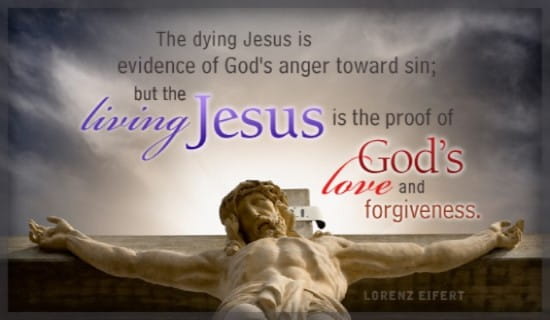Today is Good Friday. Hundreds of millions of Christians around the world will observe the day Jesus was nailed to the cross to save us from our sins. For many, it is a day of fasting. Of silence. Of prayer and contemplation. And that is as it should be. After several weeks of Lenten fasts and disciplines, many of us are eager for the celebration of Easter. But as Fr. Richard John Neuhaus observed, we’re far too quick to rush past the Triumphal Entry, the Last Supper, and the events of Good Friday. The only way to Sunday is through, not around, the important events of this week, especially Good Friday.
Let me be clear, however. No Christian ought dwell on Friday as if we don’t know what happens three days later. “Sunday’s a-comin’,” said that great African-American preacher, describing that brilliant new day which awaits confused disciples, triumphant religious authorities, and that angry mob. Sunday is not a maybe for us Christians. Christ is risen. He is risen, indeed. Thus, we won’t rightly understand anything from the Creation and the Fall of the world to the birth, life, miracles, words, or last week of Jesus Christ without having His resurrection fully in view.
Søren Kierkegaard once observed that life is lived forward and can only be understood backward. As we remember the events of Holy Week, we have an advantage that Christ’s first followers did not. We look backward. Not only that, we also have the benefit of watching the shift in the disciple’s perspective from looking forward to looking backward.
Peter’s sermon at Pentecost offers the very first, clear, Holy Spirit-led, backward-looking exposition of Holy Week events. The punchline of that rhetorical tour de force in Acts 2 is this unequivocal claim: “Let all the house of Israel therefore know assuredly, that God hath made Him both Lord and Christ, this Jesus whom ye crucified” (Acts 2:36).
Peter, like the rest of the disciples and the masses that welcomed Jesus to Jerusalem, did not have this perspective looking forward. They expected a kingdom of this world, specifically of Israel. Even as they walked with Jesus after the resurrection, the disciples were still asking, “Will you at this time restore the kingdom to Israel?”
It is only after Christ’s ascension that Peter realized the answer to that question is both yes and no. Yes, the kingdom is inaugurated. No, the kingdom is not limited to Israel. God the Father has placed all things in heaven and earth under the feet of Jesus Christ. His rule is over all. His rule was sealed by His Sunday resurrection, but it only came through His victorious death over death on that Good Friday: the Good Friday that we remember [today]. Many of us will remember it by walking through the words of Jesus from the cross.
If you’re unfamiliar with Jesus’ seven last sayings, they are: “Father, forgive them for they know not what they do;” “Today you will be with me in Paradise;” “Behold your son/Behold your mother;” “My God, my God, why have you forsaken me?” “I thirst;” “It is finished;” and finally, “Father into your hands I commend my spirit.”
Today, find some time to pray and meditate on Him Who was wounded for our transgressions, whose chastisement was the punishment for our peace, and by Whose stripes we are healed. May God grant you a glorious Easter celebration. He is risen. Indeed.
[italics and colored emphasis mine]
-------------------------------------------------------------
"Dark Calvary" - Jonn D. Morris, Days of Praise, April 10, 2020;
https://www.icr.org/article/11827
“Now from the sixth hour there was darkness over all the land unto the ninth hour.” (Matthew 27:45)
The second verse of the grand old hymn “The Old Rugged Cross” contains much truth, rich and deep.
Oh, that old rugged cross, so despised by the world,
Has a wondrous attraction for me;
For the dear Lamb of God left His glory above
To bear it to dark Calvary.
The world despises the cross and the One on the cross. “He is despised and rejected of men; a man of sorrows, and acquainted with grief: and we hid as it were our faces from him; he was despised, and we esteemed him not” (Isaiah 53:3). But yet, even in His bloodied and broken form, there is a wondrous attraction, for “surely he hath borne our griefs, and carried our sorrows: …he was wounded for our transgressions, he was bruised for our iniquities: the chastisement of our peace was upon him; and with his stripes we are healed” (vv. 4-5).
His death substituted for ours. He was the sacrificial “Lamb of God, which taketh away the sin of the world” (John 1:29). This Lamb is none other than God the Son, who willingly “took upon him the form of a servant, and was made in the likeness of men:…and became obedient unto death, even the death of the cross” (Philippians 2:7-8). Remarkably, even God the Father “despised” Him as He hung on the cross, for God is holy, and for our sakes had “made him to be sin for us, who knew no sin; that we might be made the righteousness of God in him” (2 Corinthians 5:21). The apex of Christ’s suffering came, as we see in our text, when God the Father separated Himself from His beloved Son, “forsaking” (v. 46) Christ to suffer for three hours the awful pangs of hell that we deserved. So I’ll cherish the old rugged cross. JDM
the disorder of the world. - Karl Barth
World-Wide Prayer Requests:
*Representative name or photo used to protect identity.








No comments:
Post a Comment